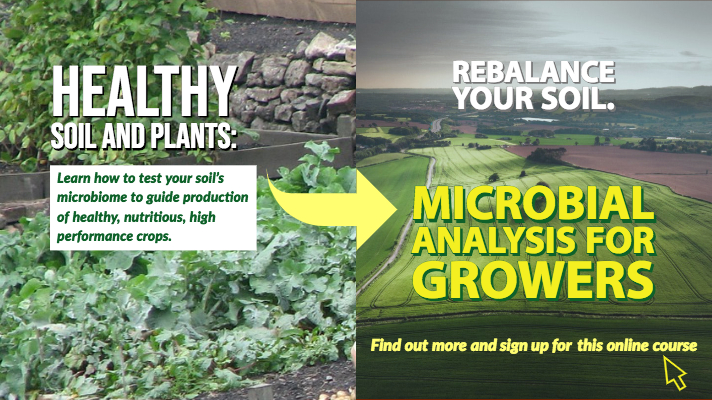Microbial Analysis For Growers
- Description
- Curriculum
- Reviews
- Grade

Traditionally, agricultural practices have often relied on methods such as crop rotations, managed grazing, and the addition of compost and manure to maintain soil fertility and health. However, a newer approach known as microbial-based soil management is gaining attention for its remarkable benefits. This method emphasizes nurturing a thriving ecosystem of beneficial microbes within the soil, reducing the reliance on the constant application of commercial agrochemicals.
One of the key advantages of microbial-based soil management is the reduced need for external inputs like chemical fertilizers. Unlike conventional practices that require repeated application of agrochemicals, the focus here is on fostering healthy microbial populations. When soil biology is appropriately managed to support these microbes, it can lead to substantial cost savings for growers. Additionally, this approach has positive ripple effects on the environment, human health, and nutrition.
The presented course aims to equip growers and consultants with a cost-effective method to monitor and assess soil microbial communities. Designed for individuals at various scales of agriculture, the course provides practical skills to optimize production methods by harnessing the power of soil microbes. Although the course assumes a basic understanding of biology principles, its applicability extends to conventional and organic growers and diverse contexts like community gardening, turfgrass management, and soil restoration projects.
Ultimately, the principles of functional microbial food webs transcend different agricultural systems. By embracing microbial-based soil management, growers can unlock the potential of their soil ecosystems, leading to improved yields, environmental sustainability, and enhanced nutritional quality.
-
6Unit 1 - Part A, Why Microbes Matter? A Few Things Microbes Do
-
7Unit 1 - Part A, Quiz
-
8Unit 1 - Part B, Why Microbes Matter? Microbes Genetic Engineering and Agrochemicals
-
9Unit 1 - Part B, Quiz
-
10Unit 2 - Why Perform Microbial Density and Diversity (MDD) Analysis?
-
11Unit 2 - Quiz
-
12Unit 3 - Part A, Choosing Microscopes and Other Equipment: Equipment You Will Need for Microbial Diversity and Density (MDD) Analysis
-
13Unit 3 - Part A, Quiz
-
14Unit 3 - Part B, Choosing Microscopes and Other Equipment: Choosing your microscope
-
15Unit 3 - Part B, Quiz
-
16Unit 4-Taking Informative Samples
-
17Unit 4 - Quiz
-
18Unit 5-Sample Preparation Protocol
-
19Unit 5 - Quiz
-
20Unit 6-Classification of Microbial Communities
-
21Unit 6 - Quiz
-
22Unit 7-Part A, Microbial Kingdoms You Want In Your Soil
-
23Unit 7 - Part A, Quiz
-
24Unit 7 - Part B, Measuring Microbes
-
25Unit 7 - Part B, Quiz
-
26Unit 7 - Part C, Recognizing Living Cells and Identifying Prokaryotes
-
27Unite 7 - Part C, Quiz
-
28Unit 7- Part D, Recognizing Eukaryotes
-
29Unit 7- Part D, Quiz
-
30Unit 8-Part A, Record Keeping: Soil Quality Estimates
-
31Unit 8 - Part A, Quiz
-
32Unit 8-Part B, Record Keeping: Estimating Density and Diversity
-
33Unit 8 - Part C, Minimizing Error, Keeping Records, and Interpreting Results
-
34Unit 8 - Part C, Quiz
-
35Unit 8 - Part D. Using Results to Guide Management
-
36Unit 8 - Part D, Quiz






